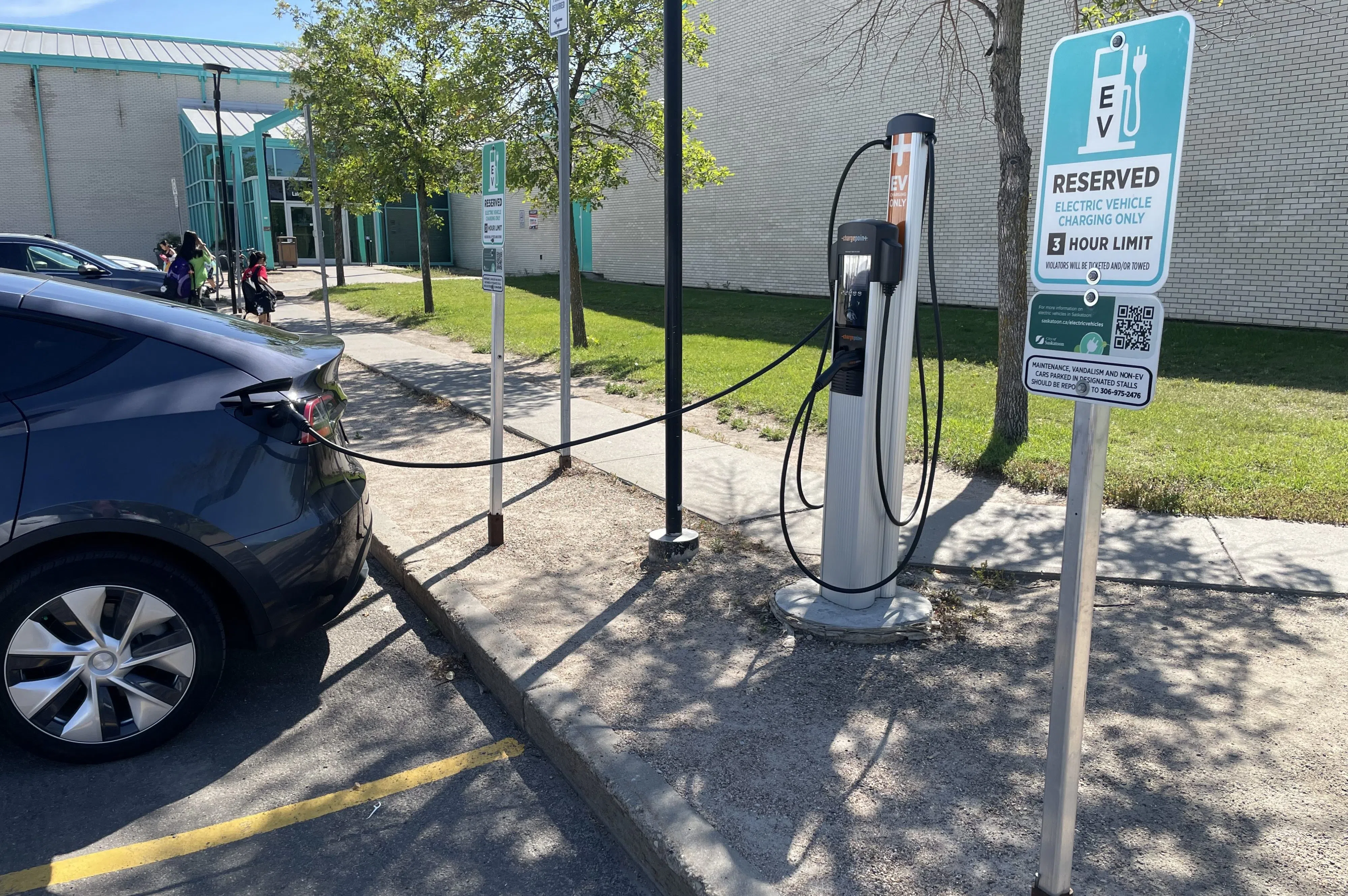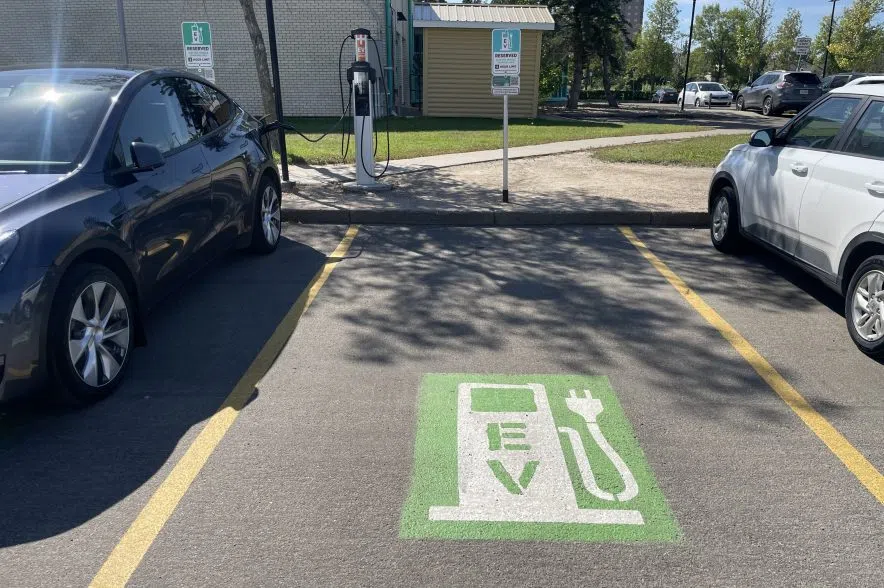Charging an electric vehicle (EV) at a city-run charger is now more expensive than in several major cities across Canada.
City council decided on Wednesday to begin charging $5.35/hour at its EV charging stations.
Read more:
- Jury delivers recommendations in 14-year-old’s death inquest
- Street weapons and EV charging costs on Saskatoon City Council’s agenda
- As mosquito counts rise in Saskatoon, entomologist offers tips to keep them in check
This comes after a two-year pilot project ended in May, which provided users with free Level 2 charging. It only impacts the ports at two charging locations in Saskatoon: Lawson and Lakeview civic centers.
The choice was made in large part to benefit taxpayers.
The options presented to city council were discontinuing the stations, keeping the price free, or raising rates to $2, $3, or $5.35/hour. Shutting them down was the only choice that would have achieved a zero per cent increase to property taxes, but selecting it would have contradicted Saskatoon’s Low Emissions Community Plan.
Administration anticipated that charging either $2 or $3/hour could keep subsidies down to $6,000 to $7,000 at the lowest end. In comparison, charging $5.35 means the impact on the mill rate will be as low as $4,000.

Even in the best-case scenario of a $4,000 subsidy, Councillor Robert Pearce said, “we’re essentially giving 40-some odd people, roughly $100 a year to park their car, like the city people are paying them to subsidize that parking.” (Marija Robinson/650 CKOM)
Those figures, according to City of Saskatoon Acting Director of Sustainability Amber Weckworth, come with a “high degree of uncertainty.”
The recommendation made to council was to select the $3/hour option, following analysis that showed higher costs resulted in fewer users.
EV drivers, “are fairly sensitive to price,” Weckworth said.
But several councillors disagreed with the recommendation, including Bev Dubois, Tim Davies, Scott Ford, Senos Timon and Robert Pearce.
“The reality of it is, we have people who can afford an EV who I believe could clearly pay $15 for three hours of charge, or $16 as opposed to $9 an hour,” Councillor Robert Pearce said during the session.
The impacts won’t be felt by too many in Saskatoon, though, with Weckworth saying that the charging stations get roughly 44 unique users a month.
What’s unknown, though, is whether all those drivers live in Saskatoon. That’s partly why Davies voted for the more expensive option, saying people in Saskatoon shouldn’t have to subsidize the charging costs for EV drivers who don’t live here.
“Saskatoon is paying for Saskatoon,” he said.
At $5.35/hour, Saskatoon’s city-run chargers will cost more to use than those in Calgary, Winnipeg, Toronto and Vancouver.
There’s no date yet as to when the price increase will come into effect.
SaskEV group opposes new rates
In a letter sent to Saskatoon city council, the board of SaskEV wrote that while they are not opposed to a fee for charging EVs, the rates are a lot more expensive compared with similar options in the community.
“For example, home charging in Saskatoon typically costs the equivalent of $1.20–$1.60 per hour, and many business-owned public stations in the city charge as little as $2.00–$2.50/hour for Level 2 charging.
“Setting the City’s rate at more than double the cost of these alternatives risks deterring EV drivers from using municipal chargers altogether,” read a portion of the letter.
William Hale is one of the board members. In a telephone interview, he said the price council approved exceeds even “fast charging” stations.
“It’s a very high price compared to all the ones that are publicly available in Saskatchewan and actually in most places we have checked,” he said.
The group said it would welcome the opportunity to discuss the issue further and to work collaboratively with city administration.
Safe Public Spaces Act
During the same Wednesday session, council opted into the Safe Public Spaces Act.
Developed by the provincial government, the Act came into force on Aug.1 and classifies a range of items as street weapons, including knives, machetes, bear spray, fentanyl, methamphetamine and needles not used for medical purposes.
It prohibits people from having these weapons in public spaces, although officers need to first be aware that someone has it on their person before stopping them.
Those spaces include public buildings, parks, playgrounds and common areas of condos or apartments.
Saskatoon Police Service requested earlier this month that the city opt into the new bylaw.
Council unanimously approves request to increase city’s debt ceiling to nearly $1 billion
City council has given administration the go-ahead to request that the Saskatchewan Municipal Board increase the debt limit for the City of Saskatoon to $973.0 million.
Currently, the debt limit is at $558 million. The last time a debt limit request was made was in 2014.
Right now, the City is forecasting to have a debt balance of $282.6 million at the end of 2025; however, another $196.4 million will also be borrowed in the next four years to help fund the new central library, transit initiatives and other capital projects.
Future projects, like the city’s water treatment expansion project, could bring the total to around $831 million by 2031. The debt ceiling increase request does not factor in costs or borrowing associated with the Downtown Event and Entertainment District (DEED).
— with files from 650 CKOM’s Lara Fominoff











